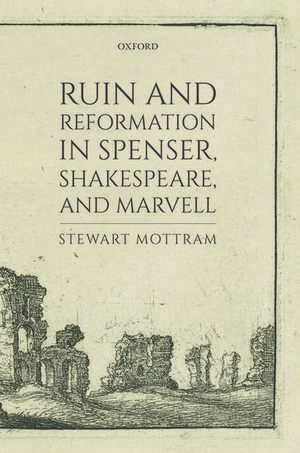Ruin and Reformation in Spenser, Shakespeare, and Marvell
Autor Stewart Mottramen Limba Engleză Hardback – 5 mar 2019
Preț: 517.28 lei
Preț vechi: 740.29 lei
-30% Nou
Puncte Express: 776
Preț estimativ în valută:
98.99€ • 102.97$ • 81.73£
98.99€ • 102.97$ • 81.73£
Carte disponibilă
Livrare economică 14-20 martie
Preluare comenzi: 021 569.72.76
Specificații
ISBN-13: 9780198836384
ISBN-10: 0198836384
Pagini: 272
Ilustrații: 8 Halftones
Dimensiuni: 164 x 240 x 22 mm
Greutate: 0.56 kg
Editura: OUP OXFORD
Colecția OUP Oxford
Locul publicării:Oxford, United Kingdom
ISBN-10: 0198836384
Pagini: 272
Ilustrații: 8 Halftones
Dimensiuni: 164 x 240 x 22 mm
Greutate: 0.56 kg
Editura: OUP OXFORD
Colecția OUP Oxford
Locul publicării:Oxford, United Kingdom
Recenzii
This book has much to tell historians and literary scholars about the complexity of attitudes towards iconoclasm and religious violence in the long reformation. Its learning is deep, its moves carefully meditated, and its resolve to wayfare across artificial period boundaries a welcome prompt to students of early modern cultural history.
a crucial interlocutor for any serious scholar or student of Milton's writing.
Stewart Mottram's engaging new book...is a well-researched book which...offers a valuable contribution to scholarship representative of the so-called religious 'turn' of English early modern studies...This book will also productively complement ongoing scholarship on antiquarianism and its uses in Tudor and StuartEngland and Wales.
The broader issues raised by this book...and, indeed, the attention paid to Wales is a welcome contribution to a literature that has hitherto focused on England.
adds to a growing literature on ruined buildings and iconoclasm during England's Long Reformation ... Mottram reads canonical literature alongside lesser-known texts, examining their depictions of literal and figurative ruins.
This book has much to tell historians and literary scholars about the complexity of attitudes towards iconoclasm and religious violence in the long reformation. Its learning is deep, its moves carefully meditated
There are few literary critics today who have his deep reservoir of knowledge in the literary, political and religious history of the period. An empiricist at heart, his command of primary texts in manuscript and print is masterful and knowledge of secondary scholarship impressive.
a crucial interlocutor for any serious scholar or student of Milton's writing.
Stewart Mottram's engaging new book...is a well-researched book which...offers a valuable contribution to scholarship representative of the so-called religious 'turn' of English early modern studies...This book will also productively complement ongoing scholarship on antiquarianism and its uses in Tudor and StuartEngland and Wales.
The broader issues raised by this book...and, indeed, the attention paid to Wales is a welcome contribution to a literature that has hitherto focused on England.
adds to a growing literature on ruined buildings and iconoclasm during England's Long Reformation ... Mottram reads canonical literature alongside lesser-known texts, examining their depictions of literal and figurative ruins.
This book has much to tell historians and literary scholars about the complexity of attitudes towards iconoclasm and religious violence in the long reformation. Its learning is deep, its moves carefully meditated
There are few literary critics today who have his deep reservoir of knowledge in the literary, political and religious history of the period. An empiricist at heart, his command of primary texts in manuscript and print is masterful and knowledge of secondary scholarship impressive.
Notă biografică
Stewart Mottram writes on representations of ruin and religious violence across English literature of the long reformation, with particular interests in Edmund Spenser and Andrew Marvell. He has held Leverhulme and AHRC Early Career Fellowships at Aberystwyth and Hull, was appointed to his current post at Hull in 2010, and has also previously taught at the University of Leeds and at Sidney Sussex College, Cambridge. He is author of Empire and Nation in early English Renaissance literature (2008), co-editor of the essay collection, Writing Wales, from the Renaissance to Romanticism (2012), and has published widely on reformation themes in early modern literature, in journals including Spenser Studies and The Seventeenth Century. He is author of the Oxford Bibliographies entry for Andrew Marvell.
